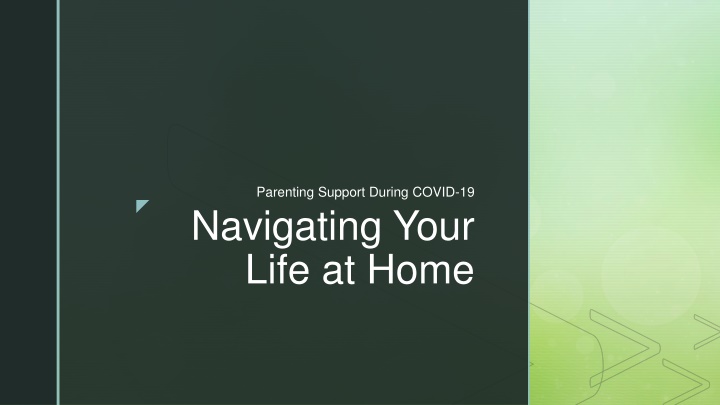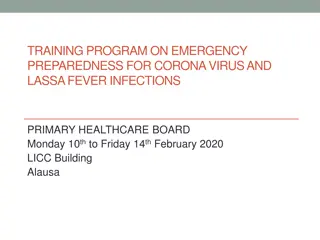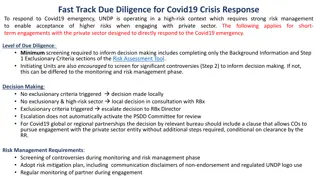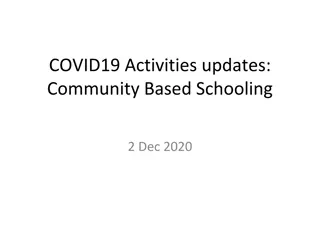
Navigating Parenting Support During COVID-19: Understanding Stress and Resilience
Explore the challenges of parenting during COVID-19, learn about signs of stress in children, and discover expert insights from therapists specializing in trauma, social skills, and more. Understand the reasons behind the stress we are feeling, identify common emotions, and discover what makes us susceptible to stress. Gain valuable tips on how to navigate your family's well-being during these unprecedented times.
Download Presentation

Please find below an Image/Link to download the presentation.
The content on the website is provided AS IS for your information and personal use only. It may not be sold, licensed, or shared on other websites without obtaining consent from the author. If you encounter any issues during the download, it is possible that the publisher has removed the file from their server.
You are allowed to download the files provided on this website for personal or commercial use, subject to the condition that they are used lawfully. All files are the property of their respective owners.
The content on the website is provided AS IS for your information and personal use only. It may not be sold, licensed, or shared on other websites without obtaining consent from the author.
E N D
Presentation Transcript
Parenting Support During COVID-19 Navigating Your Life at Home
Introduction of Therapists With Kesselman Clinical Associates Tari Getz, M.Ed., LPC specializing in trauma, social skills, parent education, and Parent-Child Interaction Therapy Candis Perlman, M.A., ATR-BC specializing in emotional regulation skills, substance abuse, art therapy, and Dialectical Behavioral Therapy Paul Kesselman, M.A., Psy.D. specializing in learning issues, Autistic Spectrum Disorder, ADHD, positive psychology, and Cognitive Behavioral Therapy
Goals of This Presentation Acknowledge that we are in new territory Assess our feelings Identify signs of stress in our children and how to respond Focus on what is within our control to change or improve Offer our expertise and some potential goals for you and your family Answer your questions
Why We re All So Stressed Lack of control over what is happening in the world at large Dealing with a novel situation Concern for the safety of ourselves and our loved ones Financial and work-related challenges Added responsibility for oversight of our children s education Major changes in daily routine Separation from social and recreational support networks Fear of the unknown
What We May Be Feeling Anxiety over how long this will last and how we will all be affected Anger and depression due to isolation, financial hardship, lack of routine, loss of the ability to celebrate life events and milestones Frustration and irritability with family members whom we are now spending so much time with but also an increased sense of closeness Overly challenged as we adjust to home schooling our children but also pride as we conquer distance learning and establish new routines Disoriented due to changes in our work routine but grateful for connection through technology and also grateful for those who continue to work despite concerns for their personal safety
What Makes Us Susceptible to Stress Our resiliency is affected by both biology and circumstances: Temperament Varying levels of physical health, chronic or acute illness or disability Parenting/Modeling Family history and current family issues Social challenges varying school and work environments, varying support networks
Importance of Self-Care Children take their cues from us it is key to take good physical/emotional care of ourselves Use technology to socially embrace your support network Get sufficient sleep Give yourself time to wind down without engaging in electronics Drink hot tea/warm milk, read, listen to music, use white noise, etc. Eat healthy, well-balanced meals, engage in regular exercise, and get 20 minutes of sunshine daily Practice mindfulness activities, such as prayer, meditation, yoga Minimize your exposure to media, and contact a mental health professional if you experience prolonged, heightened anxiety
Importance of Role-Modeling What we do and how we do it stays with our children much longer than what we say Be a model for: Openness to new ideas Flexibility when things don t go as expected Taking new information and developments in stride Proportionate reactions when something goes wrong Realistic expectations A sense of humor Willingness to practice and to try again Willingness to assist others An attitude of gratitude
Stress in Preschool Children Regression in milestones (mobility, speech, potty training) Heightened passivity or impulsivity Clinginess Constricted or repetitive play Irritability, regression in ability to self-soothe Verbal or physical aggression Eating or sleeping disturbances Physical complaints, such as headache or stomachache
Helping Preschoolers Manage Stress Ask careful questions to find out what your preschoolers know about coronavirus; ask if they have questions for you answer using age-appropriate vocabulary Ask if they feel afraid (Is there a Worry Bug in your head?) address any specific fears Talk about what fear or worry feels like in the body; use a Worry Thermometer to assess Draw pictures or use stuffed animals/dolls/action figures to act out how you will all stay safe Speak in a calm and reassuring tone this matters even more than what you say. Hug them, and give them extra time for playing and snuggling Stick to a daily routine so they know what to expect Explain that they will see their friends and loved ones again in the meantime, draw pictures, make cards, talk by phone or video chat Explain what they can do to help washing hands, covering coughs and sneezes, wearing masks, only getting close to the people they live with
Stress in Primary School Students (6-8) May be preoccupied with safety (their own, their parents, relatives, friends) Verbal or behavioral regression baby talk, telling same story over and over Unusually aggressive or reckless behavior Sleep disturbances (difficulty falling asleep, fear of sleeping alone, frequent nightmares) Changes in diet (refusing meals or certain foods, excessive hunger or snacking, self-soothing with junk food) Complaints of aches or pains, headache or stomachache
Helping Primary Students With Stress Find out what primary kids know about coronavirus correct any misinformation Encourage them to express feelings of sadness, anger, fear, and worry and validate these feelings; set aside a specific time to vent their feelings, then let go Be creative draw the virus and make fun of it, yell at it, throw it away; draw or write about what you will do as a family when the virus is under control Create a daily routine that includes learning, outside time, family time, alone time, and time for creativity in building things, drawing, singing, dancing, experimenting and esteem- building put your child in charge of showing you how to do something Help them find outlets for their stress: play games, sing songs, go on bike rides, nature walks, scavenger hunts, and teach them deep breathing and visualization Encourage responsibility: assign family chores, and let them know the part they play in decreasing the spread of coronavirus (hand-washing, wearing masks, social distancing)
Stress in Intermediate Students (9-12) Difficulty listening to you or engaging on the task at hand Impulsive or reckless behavior Heightened anxiety about their new platform for school Increased tendency toward perfectionism Sleep disturbances (difficulty falling or staying asleep, nightmares) Changes in diet (refusing or constricting, excessive hunger or snacking, self-soothing with junk food) Muscle cramps, aches and pains, headache or stomachache
Helping Intermediate Kids With Stress Find out what they know about coronavirus correct any distortion or misinformation Encourage them to express their feelings and affirm why they feel this way Acknowledge the challenge of being separated from friends and schooling online Advocate for a healthy approach to schoolwork balanced with fresh air and outdoor activity breaks; allow time to draw/journal; be available to help problem-solve, encourage do-overs Create a daily routine that includes learning, family and alone time, and time for connecting with peers through game-playing, social media, video chat, etc. Help them find outlets for their stress: relax your rules regarding technology and screen time, review deep breathing, progressive muscle relaxation, and encourage daily exercise Encourage responsibility and a sense of empowerment: assign family chores and tell them what they can do to decrease the spread of coronavirus--handwashing, disinfecting surfaces
Stress in Teenage Students Increased isolation, withdrawal from the family Difficulty focusing on/completing tasks, chores, schoolwork Impulsivity, poor decision-making, increased risk-taking Increased feelings of vulnerability and self-consciousness Irregular sleep cycle Changes in diet (refusing or constricting food intake, excessive hunger or snacking, self-soothing with junk food) Headaches, eye strain, increased aches and pains, irregular menstrual cycle, instances of self-harm
Helping Teenagers Manage Stress Talk honestly about what teens know and how they are feeling; validate their feelings and tell them that you know they will get through this When they talk about things that are out of your control, just listen and empathize Allow them to have off the clock time when you do not expect them to interact; be clear about when their involvement is expected for family time Encourage a set start and ending time for schoolwork and a day that includes breaks for exercise, healthy snacks, mindfulness, and creative activities, such as journaling Help them find outlets for their stress: relax screen time rules, encourage hobbies and new projects, allow them to socially embrace their friends while remaining physically distanced Encourage responsibility and empowerment: review their assigned chores and the role they can play in decreasing the spread of coronavirus (handwashing, making fabric masks, etc.)
Summary Get your family s input on your routine what is and is not working then be flexible and adjust Evaluate how much time needs to be structured versus unstructured Make it work for you and be consistent! A healthy routine saves you from the mental fatigue of making multiple decisions each day about what is happening next Now is an excellent time to band together as a family and set a few goals. (See the slides that follow.) Get everyone s input and pick one or two or three that seem helpful Remind each other to ask for help when needed and ask each other how you re doing a caring word can go a long way Remind your children that your family is part of a community we re all coming together to address this crisis, and it s reassuring to see how people have been there for each other Questions?
Family Goal Examples--Relationships Choose the goal that makes the most sense for your family: We will use respectful words, even when upset or angry We will have __minutes of no electronics time daily We will sit down together for __meals each week We will talk/read/sing/dance/exercise together for __minutes every day/week We will call/video chat with extended family for __minutes every day/week
Family Goal Examples--Exercise Choose the goal that makes the most sense for your family: We will limit screen time to __minutes/hours per day/week We will take a walk for __minutes every day We will find an exercise to do as a family every week (eg, walking/running, bike riding, skating, shooting hoops, playing catch, jumping rope, doing yoga, etc) We will track our steps and walk __steps every day
Family Goal Examples--Nutrition Choose the goal that makes the most sense for your family: We will eat a healthy breakfast (protein, whole grains, fruit) daily We will drink water instead of juice or soda We will eat at least __fruits and/or __vegetables every day We will limit high sugar/high salt/high fat foods to __time(s) per day/week We will eat whole grain/sprouted bread instead of white bread
Family Goal Examples--Sleep Choose the goal that makes the most sense for your family: We will turn off all screens 30 minutes before bedtime We will each go to sleep at our designated bedtime every night We will read together for __minutes before bedtime We will make our beds/bedrooms as calm and distraction-free as possible We will use white noise/soothing music/guided meditation to help us settle down for sleep
Family Goal Examples--Mindfulness Choose the goal that makes the most sense for your family: We will take a moment __times a day to notice how we re feeling physically and emotionally Before going to bed/getting out of bed, we will think of __things we are grateful for We will engage in a mindfulness activity (prayer, meditation, yoga, mindfulness app) for __minutes each day We will practice mindful breathing and calming techniques whenever we notice we are feeling stressed
Individual Goal Examples Self-Care Choose the goal that makes the most sense for you: At the end of every day, I will identify three things I did well At the end of every day, I will think of one thing I would like to change or improve At the beginning or end of every day, I will think about 5 things I am grateful for I will plan for what to do when I m feeling stressed out, angry, or overwhelmed I will ask for help/reach out for support when I need it I will connect with my partner/friend/family member __times a day/week I will reach out to a mental health provider/spiritual leader if I/my partner/my friend/my family member is concerned about my mental/emotional health
Resources Barlow, David. Mastery of Your Anxiety and Panic Workbook (teens and adults). Friedberg, Robert D. Therapeutic Exercises for Children: Guided Self-Discovery Using Cognitive-Behavioral Techniques (elementary- and school-aged kids). Huebner, Dawn. What to Do When You Worry Too Much: A Kid s Guide to Overcoming Anxiety (workbook for ages 6 to 12). Stallard, Paul. Think Good, Feel Good (adults).
Virtual Resources San Diego Zoo https://kids.sandiegozoo.org/ Yellowstone National Park https://www.nps.gov/yell/learn/photosmultimedia/virtualtours.htm Great Wall of China https://www.thechinaguide.com/destination/great-wall-of- china Mars http://accessmars.withgoogle.com/ National Gallery of Art https://www.nationalgallery.org.uk/visiting/virtual-tours Books Read by Actors https://www.storylineonline.net/ Join us in May 2020 for our COVID-19 Parent Support Group! Email your name and the age of your children to tari@kesselmanclinical.com.









